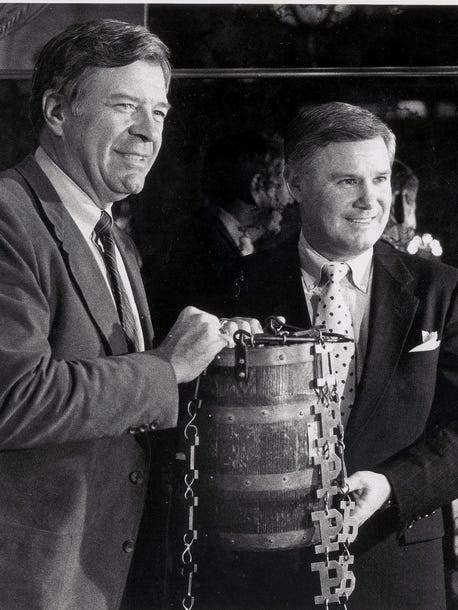Forgotten Glory: The Untold Legacy of Bill Mallory, the Coach Who Changed Indiana Football Forever
When people talk about Indiana University, the conversation almost always turns to basketball. Names like Bob Knight, Assembly Hall, and NCAA titles dominate the narrative. But buried beneath the hardwood legacy lies a forgotten chapter — one that deserves its own spotlight. It’s the story of Bill Mallory, the man who quietly turned one of college football’s perennial underdogs into a team of belief, grit, and relevance.

More than two decades after his final game on the Hoosier sidelines, Mallory remains the winningest coach in Indiana football history, yet rarely gets the recognition he earned. His name doesn’t echo in stadium chants. His story doesn’t grace ESPN documentaries. And his legacy — perhaps the most transformative in IU football history — is largely untold.
This is the story that needed to be told. And now, finally, it is.
A Program Without a Pulse

To understand the significance of Bill Mallory’s impact, one has to understand where Indiana football stood before he arrived. The Hoosiers were, in the words of many national pundits, an “easy win” on the Big Ten schedule. The program had suffered from years of inconsistency, coaching changes, and a lack of identity. Aside from the 1967 Rose Bowl season, there had been little to cheer about.
When Mallory arrived in 1984, he inherited a team that had just finished 3–8. The situation was grim. But Mallory, known for his no-nonsense Midwestern discipline and unshakable optimism, saw opportunity where others saw hopelessness.
The Quiet Rise
Mallory didn’t build his team with gimmicks or flashy promises. He built it the hard way — through tough practices, a commitment to fundamentals, and recruiting players who bought into his vision of hard work and accountability.
By 1986, just two years into his tenure, Mallory led Indiana to a bowl game — their first since 1979. And then, he kept going. Under his leadership, the Hoosiers went to six bowl games in an eight-year span (1986, 1987, 1988, 1990, 1991, 1993). No Indiana coach had done that before. No one has done it since.
In 1988, Indiana finished 8–3–1, and Mallory was named Big Ten Coach of the Year. That team featured Anthony Thompson, one of the greatest players in program history, who finished second in Heisman Trophy voting in 1989. Mallory recruited and developed Thompson — a testament to his eye for talent and his ability to help young men maximize their potential.
Perhaps most impressively, Mallory achieved all this in a program with fewer resources and less national visibility than many of its Big Ten rivals. He proved that Indiana could compete — not just occasionally, but consistently.
A Coach of Integrity
Bill Mallory wasn’t just a coach — he was a leader of men. Former players speak of him in reverent tones, recalling how he demanded the best of them, not just on the field but off it. He preached character, discipline, and education. His locker room was one of accountability, where no star was bigger than the team.
“He made us believe,” said one former player. “Even when the world didn’t.”
Mallory never chased headlines or accolades. He wasn’t a soundbite coach. He let the work speak for itself. And in doing so, he created a culture of quiet excellence that still resonates today, even if silently.
An Unfair Exit, an Unspoken Legacy
In 1996, after a disappointing season, Mallory was let go. Some fans felt the decision was premature — a reactionary move in an era increasingly driven by short-term results. His departure marked the end of Indiana’s most stable and successful football era.
What followed was years of turbulence. The Hoosiers cycled through coaches, flirted with relevance, but never recaptured the consistency Mallory had delivered.
To this day, he remains Indiana’s all-time leader in wins (69), and his tenure is still the program’s high-water mark for sustained success. Yet, there is no statue. No national tribute. No documentary. Just fading memories among aging fans who remember when Indiana football mattered.
Why His Story Matters Now
In recent years, Indiana football has flirted again with national respectability. Under Tom Allen, the 2019 and 2020 seasons reignited belief in what IU football could be. But even those efforts stand in the shadow of what Bill Mallory built.
It’s time for Indiana to fully embrace its football history — the good, the bad, and especially the overlooked. Because if you don’t honor those who laid the foundation, the future you build will be unsteady.
Bill Mallory deserves more than quiet gratitude. He deserves to be celebrated, remembered, and studied as a case of what happens when belief meets purpose. He didn’t just win games. He changed a culture.
Final Whistle
Bill Mallory passed away in 2018 at the age of 82. But the legacy he left behind — the respect he brought to a forgotten program, the men he shaped, the standard he set — still echoes in Bloomington, even if the stadium doesn’t always say his name aloud.
It’s time it did.





















